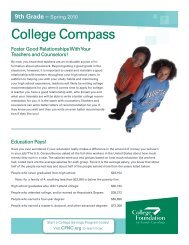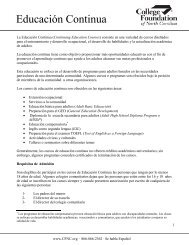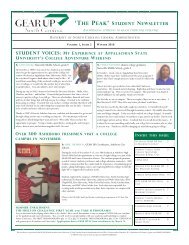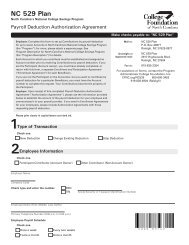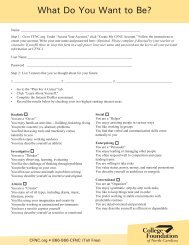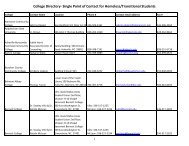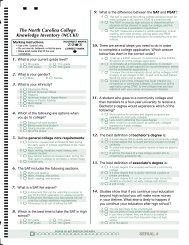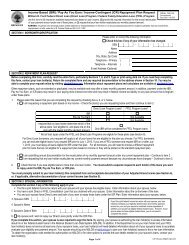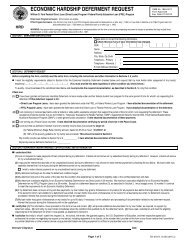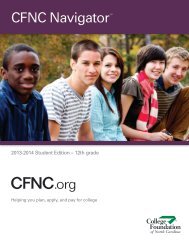August - Junior Progress Check 11th Grade Learning Outcome ...
August - Junior Progress Check 11th Grade Learning Outcome ...
August - Junior Progress Check 11th Grade Learning Outcome ...
Create successful ePaper yourself
Turn your PDF publications into a flip-book with our unique Google optimized e-Paper software.
November – Managing Your Money<br />
11 th <strong>Grade</strong><br />
<strong>Learning</strong> <strong>Outcome</strong><br />
Students will learn strategies for managing money, how to create a budget, and tips for planning<br />
financially for college.<br />
NC Standard Course of Study Alignment (Guidance, <strong>Grade</strong>s 9-12): 4.05, 4.07, 7.02, 8.09<br />
Introduction<br />
Managing money is a very useful skill, and practicing managing money now (even if you don’t have<br />
much to manage) can make you a better money manager in the future. The average college graduate<br />
leaves college for the “real world” with $4,000 in credit card debt and $18,000 in college loans to repay.<br />
Let’s take steps now to avoid some of that debt!<br />
Activity<br />
1. Have you ever wondered where your money goes? The best way to answer that question is to keep<br />
a running list of expenditures. Begin to fill in the expected income/expenses spaces in your activity<br />
listing sources of income and projected expenses for the month. Add up the totals – this is your<br />
projected budget.<br />
2. Read the Smart Money Management Tips on the second page of this activity. In small groups,<br />
students should brainstorm ideas for earning money and for saving money.<br />
3. Have students go to CFNC.org/11-12 to listen to a short podcast about money, in which college<br />
students offer tips on managing money based on their experiences – good and bad!<br />
4. Students can also find fact sheets on CFNC.org/11-12 for more information on creating good<br />
spending habits and creating a budget.<br />
5. Return to the activity and ask students to track actual expenses in the spaces given for the next<br />
month. Remind them, “Don’t forget to include the soda you bought at lunch!” Have them set a date<br />
to revisit this activity next month to check out their spending habits.<br />
Wrap Up<br />
Have students write a short paragraph identifying possible future purchases for which they will need to<br />
save. What might they need to save for in the next two years? Next 10 years? How can a budget help<br />
them save money for these things?<br />
Introduce them to the Financial Literacy 101 course on CFNC.org under the PAY tab. Point out that they<br />
can take this course and it will keep track of their progress (allowing for stopping and starting). Note the<br />
resources link and the calculators. Assign modules as homework or encourage them to do the course on<br />
their own.<br />
IMPORTANT: Significant navigational changes to CFNC.org are expected in 2009-10. Use of the landing<br />
page (CFNC.org/MS) for completion of these activities will make it easier to find needed resources.<br />
© 2009 Pathways, College Foundation, Inc., and State Education Assistance Authority (CFNC)



